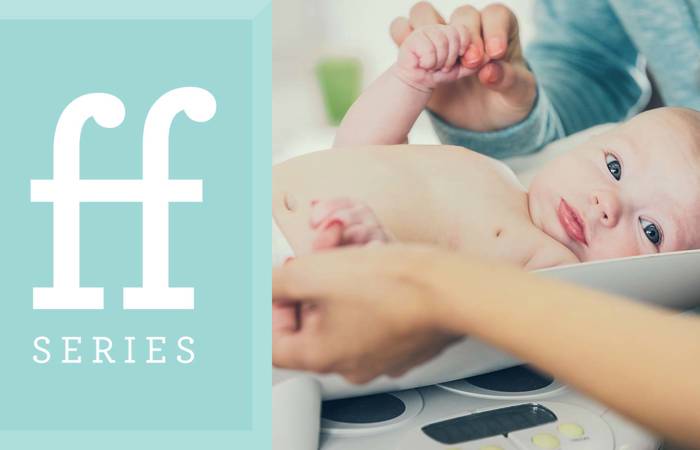Like what you see?
Sign up to receive more free parenting advice.
Thank you for subscribing to our newsletter!
Child Development

Credit: iStock.com/miodrag ignjatovic
We use our mobile phones to track all aspects of our lives and feeding our newborn is no different.
Replacing the safety pin which reminded new mothers which side to next breastfeed on, apps designed to track everything an infant does, including breastfeeding, are now widely available.
“Infant feeding apps are relatively new and given the proliferation, they seem very popular,” says senior researcher Dr Jacqueline Miller, College of Nursing and Health Sciences at Flinders University who was part of a study that interviewed nine mothers to understand why they use infant feeding apps.
“For some mothers, it gave them reassurance that things were going normally, particularly in the early days of feeding when things were still establishing,” she says.
“For others, the data produced by the app was a bit overwhelming, however, instead of relying on memory it provided a record of things that could then be discussed with a health professional.”
“We know from the 2010 Australian National Infant Feeding Survey that most mothers, 96 per cent of them in fact, want to breastfeed,” says Nerida Haines, Senior Manager at Australian Breastfeeding Association.
“They understand the importance and value in breastmilk and breastfeeding, however, only around 15 per cent of babies are still exclusively breastfed at five months.”
The World Health Organisation recommends exclusively breastfeeding until the infant is six months old.
Nerida explains that a range of factors contribute to the decline, the biggest one being access to timely evidenced-based professional support.
Could infant feeding apps be a new support system for mothers with their breastfeeding goals?
For some mothers, it gave them reassurance that things were going normally, particularly in the early days of feeding when things were still establishing. For others, the data produced by the app was a bit overwhelming, however, instead of relying on memory it provided a record of things that could then be discussed with a health professional.Dr Jacqueline Miller
Stay up to date with the latest news and articles from First Five Years
Thank you for subscribing to our newsletter!
The pros and cons of infant feeding apps
“Breastfeeding has been happening successfully for thousands of years, and so using an infant feeding app is certainly not necessary,” says Dr Miller.
“However, for most of the women we interviewed in our study, it gave them some reassurance to collect data about feeding and other aspects of baby care, reassured them and gave them a sense of control.
“It allowed them to look back and find some patterns and order with feeding and baby care even when it seemed overwhelming.”
One mother within the study expressed that with newborn-induced sleep deprivation the app provided her the ability to not have to remember all the details.
“I did feel more confident and in control because, I didn’t have to remember this information, [without the app I wouldn’t have remembered the information] so I would have been flustered and I would have felt stressed and I would have thought, well I’m not doing my job as a mum.”
Another mother said that the app helped mothers look at the bigger picture of those first few intense weeks.
“Even when you think things aren’t going to ever get better or how is this ever going to be quicker, you could look and see that actually yes this is, because you might not see little bits every day but over a period of time you would definitely see that you’re making improvements.”
As for the disadvantages, Dr Miller says they found that some apps provided incorrect information and advice.
For example, she says one app used an algorithm to calculate the amount of breastmilk a baby consumed based on the time spent feeding.
Not only can the data be incorrect, as all babies feed differently and it is difficult to calculate how much a baby has breastfed due to variables such as sucking ability, but it can also negatively impact the mother’s decision to continue on with breastfeeding by providing incorrect data.
Another concern about infant feeding apps is the ramifications of push notifications.
“Some of the apps send push notifications or reminders of when to feed the baby,” says Dr Miller.
“One of our concerns, that prompted this study, was the potential for apps to override the baby led and responsive style of parenting which we know is so beneficial for long term breastfeeding.
“By ‘baby-led and responsive parenting’, I mean tuning into the baby’s cues and feeding on demand rather than according to a schedule.
“Reminders to feed at certain times encourages schedule feeding and may be counterproductive.”
Finally, Dr Miller says that some mothers felt a bit overwhelmed with all the data the apps created, and it took away from intuitive parenting.
This is where an app like ABA’s Mum2Mum can be useful.
“A good, evidence-based breastfeeding app providing well-researched and peer-reviewed information can form an important part of a breastfeeding mum’s support,” says Nerida.
“ABA recommends that mums use Mum2Mum, in conjunction with other breastfeeding support services.
“These include our local group meetings where connections are made, our Breastfeeding Helpline or LiveChat support services, supportive health professionals and lactation consultants where required.
“It is important to not rely on an app as the only form of breastfeeding support.
“The use of an app should not put unnecessary pressure on a new mum to record and over-analyse all aspects of her baby’s eating and sleeping cycles.
“Rather, it should support mums to meet their breastfeeding goals by providing easy-to-use tools and relevant, evidence-based information, right when a mum needs it.”
Dr Miller recommends to not, “let the app take over your parenting or get overly obsessed with it”.
“If you have concerns about your baby’s feeding or progress then discuss with a health professional before you make any decisions based on the data in the app.”
If you are struggling with breastfeeding, ABA’s Breastfeeding Helpline is available 24/7, 365 days a year on 1800 686 268 and is operated by trained volunteer breastfeeding counsellors who are also mothers themselves.







